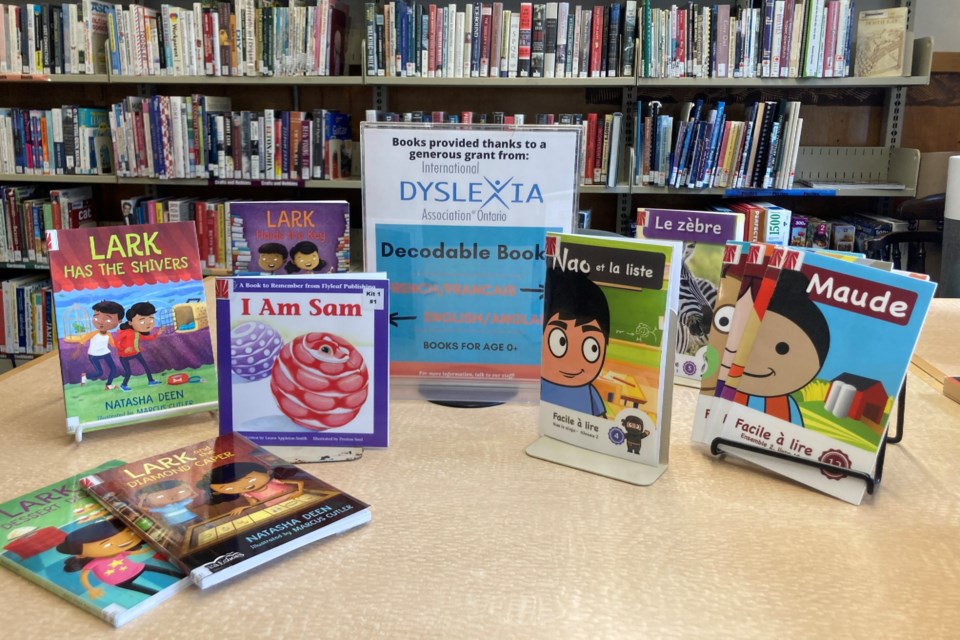A nationwide "Mark it Read Campaign" designed to bring awareness to dyslexia, is now in its fifth year led by Dyslexia Canada.
To represent the challenges these children have in school, the campaign will light buildings and monuments across Canada red throughout October, which is International Dyslexia Awareness Month. This campaign is to encourage communities across the nation to #SayDyslexia and to light up red in support.
The Callander Public Library is getting involved.
Thanks to the International Dyslexia Association of Ontario (IDAO), the library received a grant last year to purchase decodable books and dyslexia resources.
The books are designed with very specific phonic instructions. They use specific words that help struggling readers decode the sounds of the word, which is something that people with dyslexia and other language-based disabilities have trouble with. They have a series of books, with each using previous lessons to further the reader's knowledge.
Due to the high cost of these specialized resources, the library would not have had the available funds to buy them and make them available to the community.
"The Callander Public Library has seen an increase in patrons looking for books to help children who are struggling with reading, " Melissa Sones, library CEO told BayToday.
The resources are available now in the communal work area of the library so they’re easier to find.
"The key is early intervention, as the learning disability is a spectrum," added Sones. "As children grow up, some may be able to overcome it and not even realize they were dealing with it. With early intervention methods, it helps parents and educators catch it early which, in turn, makes it easier for them to help the child keep pace with their classmates."
The City of North Bay is not hosting any event related to this although you can seek treatment here or help here.
"For the many kids struggling with dyslexia, the red pen is a constant reminder of the lack of awareness and support needed for them to learn to read, write and spell with their peers and be successful in school and in life," says a news release. "Dyslexia Canada is on a mission to establish legislation in each Canadian province to identify children early and ensure mandatory remediation throughout the education system."
"Dyslexia is the most common cause of reading difficulties," said Alicia Smith, Executive Director of Dyslexia Canada. "With early identification and appropriate support children with dyslexia can learn to read well and succeed in school and life. However, most children with dyslexia in Canada are not being identified or properly supported at school. These kids are suffering needlessly and we are working to change that.
"Over the past year, we have seen major steps toward recognizing dyslexia across Canada. Several provinces have also started to make the changes to early reading instruction that children with dyslexia need to succeed. However we still do not have universal early screening, and far too many children are not getting the support they need at school.”
Dyslexia Canada is a national charity committed to ensuring that every child in Canada with dyslexia gets a fair and equitable education.
It was formed in 2016 to ensure that there was a national voice and forum to advocate for all Canadian children with dyslexia. By partnering with professional organizations, experts, and advocates, Dyslexia Canada strives to drive systemic change by engaging and educating the public and establishing legislation specific to recognizing and remediating dyslexia.
Dyslexia is a specific learning disability in reading and writing.
In Canada, two to four children in every classroom struggle with dyslexia.
“The truth is, getting the help a child with dyslexia needs to learn the fundamental skill of reading is out of reach for most. Canadian families and teachers are not being provided the tools and resources they require” says Keith Gray, Chair of Dyslexia Canada. “We hear stories of children being grades behind, and their parents and teachers are feeling helpless. We need a comprehensive approach at a systemic level that ensures children with dyslexia get the education and chance at life that they deserve.”



